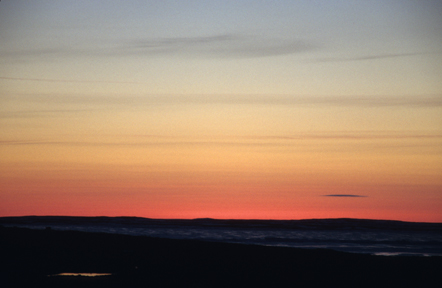I wrote the music of the song when I was in Rankin Inlet after I had visited some of the more remote communities. I brought my guitar with me and when I had a couple of hours to myself, I sat down and wrote the melody to Isuqangitumut, an Inuit word loosely translated as To a Time with No Ending. The lyrics were written at home the following week.
Much like the lifestyle of the people who inhabit the region, the melody isn’t complicated and neither are the lyrics, yet there is undeniably a pervasive haunting tone to the song. Combined with a seductive redundancy, the music and lyrics were combined to express a sense of eternal isolation found only in the texture and vast expanses of land and the joy and struggles it embodies. If you listen carefully you can almost hear the howling of a lone wolf in the moaning slide of the bass guitar, the breaking ice flows embodied in the crash of the cymbals, and the subtle sounds of the congas imitating the almost imperceptible tapping sounds of the animals as they circle their prey. The lyrical repetitive tone of the guitar seems to intone the echo of real emotional solitude.
The lyrics were difficult to write because they had to be simple. They needed to reflect not only my own thoughts and feelings, but also the thoughts and feelings of the people that I encountered on my brief journey. I was told by many Inuit that my words were too poetic. I was reminded often that I should say what I mean. Yet by listening to them speak to one another, I discovered a rhythm and texture of sounds so naturally poetic that their thoughts and feelings seemed to be communicated only through these elements. At times it seemed as though they were creating a separate language only they understood.
So I kept the metaphors simple and clear, much like the stories that they shared with me. They spoke to me of dreams and lakes and water and rocks and hunting and fishing and isolation and an undying love for the land, even in its harshest moments.
When I approached Noah to sing his part, he seemed open to the idea. So we practiced a bit in Rankin Inlet before heading to the studio. Once there however, he changed his mind. He waited till everyone had left except for Jesse, the engineer and me, at which point he decided that he would rather speak than sing. And so he did. He spoke of a time that had no ending and of loss and closeness to the people and the land that he knew. In his voice, you can actually hear the whisper of the wind and biting harshness of the land only he could express.
In the end, we were all pleased with the recording, especially Noah and Jesse who both hail from Rankin Inlet. “It’s not what we would have written,” they so subtly pointed out to me on the way out, “but for someone who just met us, you did okay.”
What I remember the most of the evening’s experience is Jesse’s look of pride and ownership when she watched Noah speak. And when we listened to the complete recording for the first time, Jesse told me that the song had really “touched her heart”. What more could anyone ask for.


